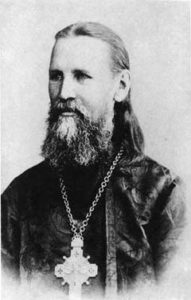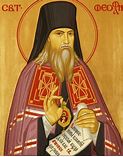SSCORRE!
Saint Sophia Cathedral
Online Resources for our Religious Edification

Topic of the Week: “May It Be Blessed”
“…What is the meaning of and when do we say the well-known expression – I won’t call it magical, but so rich in content – “May it be blessed”? We hear this expression frequently; monastics say it, and now more and more people around the world, including laypersons, have become accustomed to saying it: “May it be blessed….”
From the morning when one wakes up and is still at home but also after leaving the house to go to work, where there will be contact with other people and there will possibly be difficulties, obstacles, friction, and other such things, it is good – very good – to learn to say “May it be blessed.”
…from what I know, I believe that any Christian who not only understands the deeper meaning of the expression – it’s not just a matter of deciding to say this phrase – but will also learn, will continue to say it habitually, for him everything is settled, because this phrase contains everything. He will find his way and problems will be solved and his soul will be more and more free and the joy of God will spread through such a soul….”
Excerpted from May it Be Blessed, pp 13-14, transcribed homily of Archimandrite Symeon Kragiopoulos
Read more quotes from blessed Arch. Symeon at The Orthodox Path
Adult/Family:
Preschool/Elementary:
There is nothing that doesn’t work for our soul
“Question: With all that you’ve told us, the words of the Apostle Paul too are understandable: To all those who love God, all things work to the good.
Father: That’s right. There’s nothing that doesn’t work for our soul.
is all for our good, even a fall, as long as you fall as a man, but immediately you run to God without being disheartened or getting angry. Because there are some who start like this: “Oh, my God, I prayed, I did this, I did that, – and You didn’t hold me but let me fall?”
No. Say: “May it be blessed.” Saying “May it be blessed” is like you’re saying: “Good that I’m suffering. Serves me right. I needed this, to fall, to learn a lesson, because I had started getting big ideas.” Say “May it be blessed” and, as soon as you humble yourself, you will immediately be redeemed.
This is precisely what King David is saying. He means something a little bit different there, of course, but it’s useful for us: I was humbled and saved. As soon as I was humbled, the Lord saved me. In another place he says: Good for me that Thou didst humble me.
It is salvation for me that Thou humblest me through sorrows.”
Excerpted from May it Be Blessed, pp 66-67, transcribed homily of Archimandrite Symeon Kragiopoulos
Middle School:
“…Let’s say you’re sick or you have a problem or one of your relatives is sick or you have a problem with your relative. In these cases, of course, these issues contribute in you praying fervently, persistently, praying from your heart. You’re praying and you want to get well, you’re praying and you want your relative to get well, you’re praying and you want your problem or the problem of your relative solved. That’s good, it’s not bad for anyone to do that. It’s precisely what we should do with all the strength of our soul. However, if you look closely at it, the situation has some self-interest in it. What do I mean by self-interest? At bottom, it means that we want things to happen according to our own will. And you know that when a thing has self-interest in it, it easily happens that it doesn’t take much effort to do.
But if at this crucial moment you pray and say what you have to say to God about your problem, about the difficulty that you’re having, but in the end you constrain your heart, you marshal your strength, you stand before God with all your love, with all your obedience – with all your feeling that you are a creature of God and that God is above – and you say: “But my God, may these things happen as Thou willst. May it be blessed” now that’s difficult.
I know many people, both here and in Greece and all around, everywhere I’ve gone, who make burning, fervent prayers for some problems of theirs to be solved, as we’ve said, but I know few who would say – because it is very difficult – who have the courage, every time they find it heavy going and are having difficulty, saying precisely what the Lord said three times there in the garden of Gethsemane: My Father, if it is possible, take this Cup from Me, but not My will be done, but Thine.”
Excerpted from May it Be Blessed, pp 32-33, transcribed homily of Archimandrite Symeon Kragiopoulos
High School
When God Allows That Which You Never Expect
“in the martyrs, and more generally in the saints, we see nothing of this spirit of ours, of our mentality. They believed in God, hoped in God, prayed, they did whatever they did, but not so that they would be accommodated. No. They were given up to God, to His will, to His joy; in all the trust they had in God, they let Him act as he willed. Because, between us, if God doesn’t make us as he wishes, we can’t become Christians.
We will not become Christians just by trying by ourselves to make ourselves, not matter how much we believe in God, no matter if we have certain things in mind and struggle in a way. It doesn’t work like this. If man were saved just by his own efforts, if he were sanctified by his own powers, if the entire issue of salvation of man could be arranged just with a man’s good intention, Christ would not have come to the earth. Christ wouldn’t have founded the Church, He wouldn’t have given the Holy Spirit to be present in the Church, nor would He have left us the Mysteries so that we find Grace there. Christ wouldn’t have founded the Church just in order to arrange our issues or simply so that we are punctual with respect to our spiritual duties, as we say; but mainly in order to open our souls, so that we be surrendered to God, and so that Grace will come into us in order to care for us, without being hampered or hindered by us.
How many of us can really at this moment with sincerity and honor stand before God and say: “O my Lord, Thou knowest that I want nothing more. The only thing I want: take charge of me and make me whatever Thou willst, whatever it might cost me.” I don’t know how many would say this. But this too isn’t very difficult to say. The difficult thing is, when the time comes and God shakes you and allows – I don’t know what He will allow: that which you would never expect – is to say “May it be blessed.” Would you say it then? From what I have understood, and believe that you too have understood, for each of us God will allow that which we don’t expect.
From the give and take that I have with people, I have discovered that almost all people say: “If it’s just this, if it’s just that…. But it’s the other thing, too.” That “but” which one puts in here, spoils it all. And all of us humans have it. I mean, we think that if God had allowed us to endure this, that, and the other, we would have been able to bear them, but behold, He allowed something else and that’s unbearable. That, then, which you yourself believe you will not be able to stand, is precisely that which you will be called to endure.
God doesn’t ask us. If He did ask us, we wouldn’t endure a thing. We would say: “Look, i want this, that, I can do this but not the other thing.” No. Here is what we say so that it will be left with God, so God will let whatever He deems – God knows- come over us, and what remains for us is to say: “Oh, my God, Thou seest better than I know much this strains me, how much it pressures me, how unbearable it seems to me. Thou seest, my God, that I’m having a hard time drinking this cup” – the time time drinking this cup” – the time will come for everyone when they say this – “but may it be blessed. May it be blessed. Since Thou willest it this way, because Thou wantest it thus, may it blessed. May it happen as Thou willst.”
Excerpted from May it Be Blessed, pp 42-45, transcribed homily of Archimandrite Symeon Kragiopoulos
A Message from Maria Spanos
I am passionate about our Orthodox Christian faith and seek to help others learn as much as they can about it. My purpose here is to share online resources that help strengthen our relationship with Christ and bind us closer to His Church. I believe they are invaluable in learning about our precious Orthodox Tradition, and are a great aid for teaching family members, friends and others about Orthodoxy. ~Maria
Two of my favorite quotes:
 “A true Christian behaves in this life so that it may be a preparation for the future one and not only a life here below. In his actions, he does not think what will be said of him here but of what will be said there in heaven; he represents to himself that he is always in the presence of God, of the angels and all the saints, and remembers that someday they will bear witness of his thoughts, words, and deeds.” — Saint John of Kronstadt
“A true Christian behaves in this life so that it may be a preparation for the future one and not only a life here below. In his actions, he does not think what will be said of him here but of what will be said there in heaven; he represents to himself that he is always in the presence of God, of the angels and all the saints, and remembers that someday they will bear witness of his thoughts, words, and deeds.” — Saint John of Kronstadt
__________________________________________________________

“Of all the holy works, the education of children is the most holy.”
— St. Theophan the Recluse






